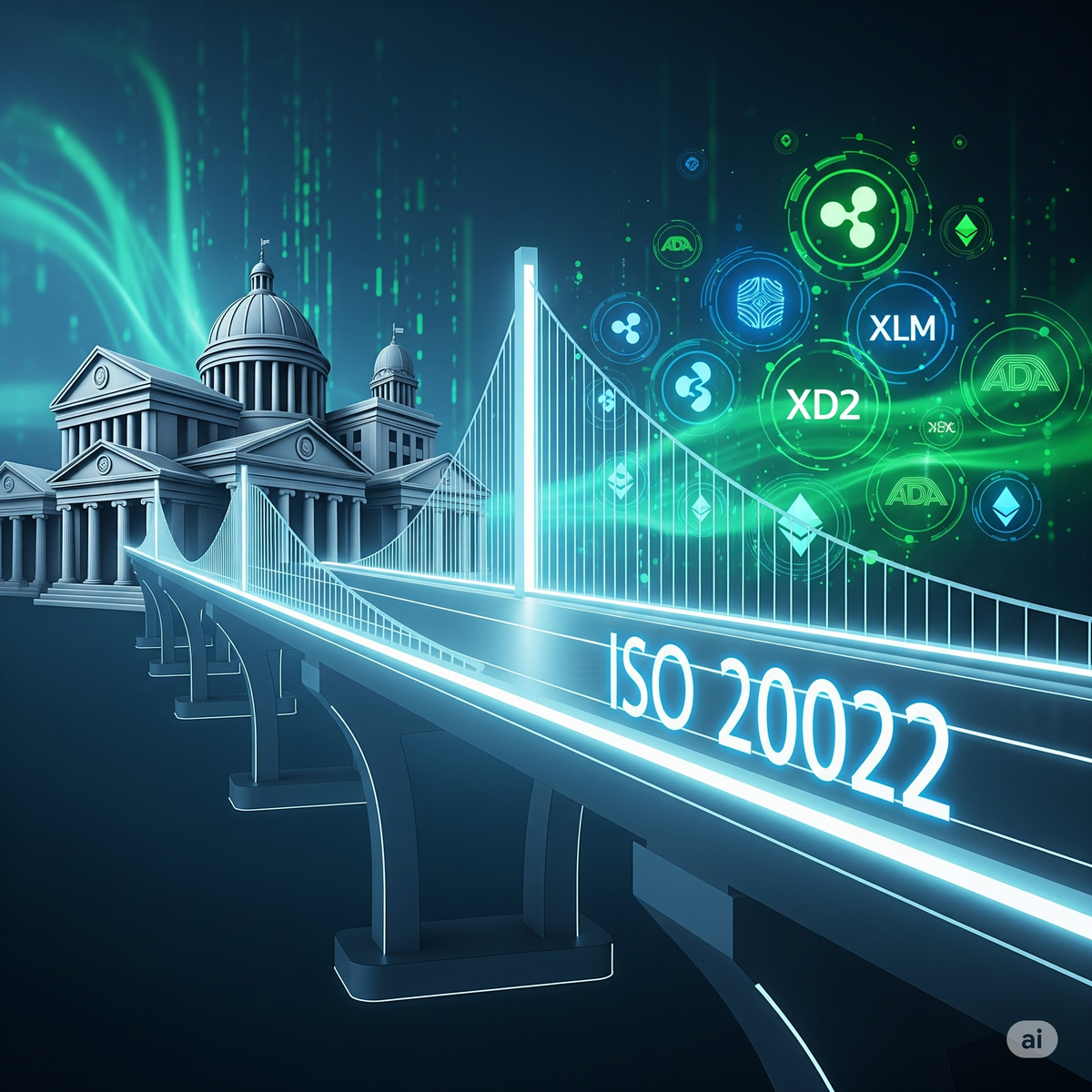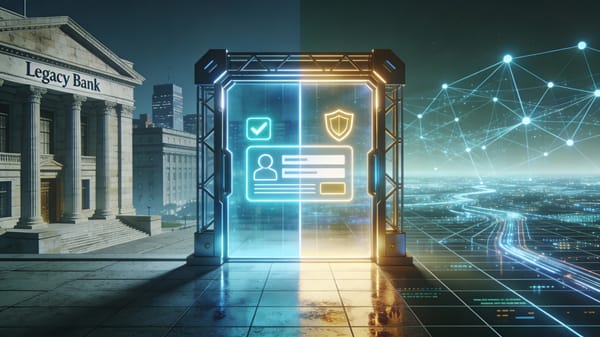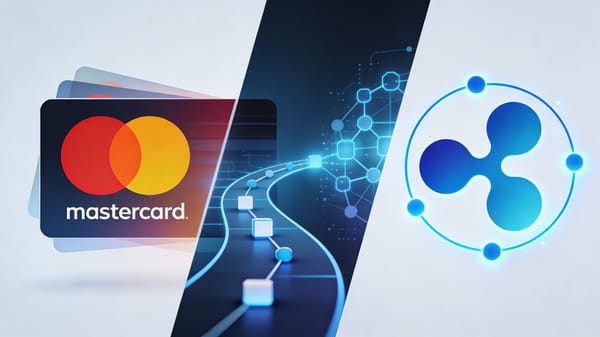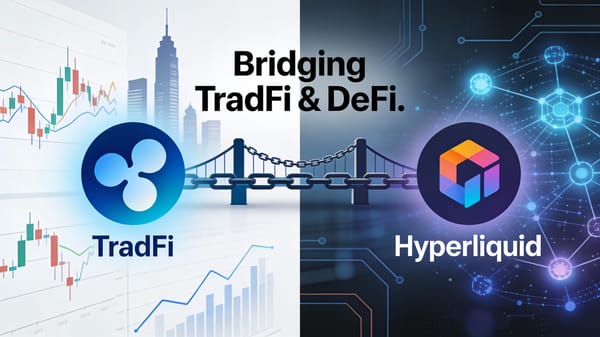ISO 20022 Crypto Revolution: The Future of Financial Compliance
Federal Reserve's ISO 20022 implementation creates trillion-dollar opportunity for compliant cryptocurrencies. Eight major digital assets are positioned to bridge traditional banking with blockchain technology.

Breaking: Federal Reserve's July 14, 2025 implementation of ISO 20022 for Fedwire fundamentally changes how cryptocurrencies interact with traditional banking—and eight major digital assets are already positioned to capitalize on this trillion-dollar opportunity.
The ISO® 20022 migration is complete! It's time to start exploring the possibilities: https://t.co/6Lye2HVJFx #payments #ISO20022 #banking #Fedwire #FederalReserve pic.twitter.com/TOzQhslztV
— Federal Reserve Financial Services (@FRBservices) August 20, 2025
The ISO 20022 Standard: What It Actually Is
ISO 20022 is the global messaging standard for financial institutions, serving as the universal language that enables banks, payment processors, and financial networks to communicate with each other. Developed by the International Organization for Standardization in 2004, this XML-based protocol provides a structured framework for exchanging financial data, carrying up to 10 times more information than legacy systems like SWIFT's MT format.
Think of ISO 20022 as the Google Translate for global finance—it ensures that a payment instruction from a bank in Tokyo can be perfectly understood by a financial institution in New York, regardless of their internal systems.
What ISO 20022 Is NOT
Contrary to popular misconceptions, ISO 20022 is not:
- A blockchain or cryptocurrency network
- A replacement for SWIFT (it enhances SWIFT's capabilities)
- A payment rail or settlement system
- A regulatory requirement for individual crypto tokens
Instead, when we refer to "ISO 20022 compliant cryptocurrencies," we mean projects that use elements of the messaging standard to facilitate communication between their networks and external financial systems.
The Federal Reserve's Game-Changing Implementation
On July 14, 2025, the Federal Reserve implemented ISO 20022 for the Fedwire Funds Service in a single-day transition, replacing the legacy FAIM format and affecting all U.S. domestic wire transfers. This milestone represents more than a technical upgrade—it's the foundation for blockchain integration into traditional banking infrastructure.
By November 2025, approximately 80% of global financial transactions will utilize the ISO 20022 framework, creating an unprecedented opportunity for compliant cryptocurrency projects to access institutional markets.
Eight Cryptocurrencies Leading the Compliance Revolution
Eight cryptocurrencies are currently recognized as ISO 20022-compliant: XRP, Stellar Lumens (XLM), XDC Network, Cardano (ADA), Algorand (ALGO), IOTA (MIOTA), Hedera Hashgraph (HBAR), and Quant (QNT).
XRP: The Compliance Pioneer
Ripple became the first distributed ledger technology company to join the ISO 20022 Standards Body in May 2020. XRP settles payments in 3-5 seconds with minimal fees, handling 1,500 transactions per second, making it ideal for the high-frequency, low-cost transactions that ISO 20022 enables.
Stellar Lumens (XLM): Financial Inclusion Focus
BP Ventures completed ISO 20022 implementation on the Stellar blockchain, potentially opening trillions of dollars worth of financial sector transfers to the Stellar network. Stellar's emphasis on connecting underbanked populations aligns perfectly with ISO 20022's goal of improving global financial accessibility.
XDC Network: Trade Finance Specialist
XDC Network focuses on practical applications in trade finance and supply chain management, using XinFin Delegated Proof of Stake for quick transaction confirmations while maintaining security.
XRP's Regulatory Breakthrough
The SEC's five-year legal battle with Ripple officially ended in August 2025 when both parties agreed to dismiss their appeals, with Ripple paying a reduced $125 million penalty. This resolution provides XRP with clear legal status for secondary market trading, removing the primary regulatory overhang that had suppressed institutional adoption.
The SEC even approved the ProShares Ultra XRP ETF in July 2025, marking the first XRP-focused investment product to clear all regulatory hurdles in the United States.
Market Implications and Partnership Opportunities
The convergence of ISO 20022 adoption and crypto compliance creates massive opportunities:
Enhanced Data Quality: ISO 20022 messages can carry 10 times more data than legacy formats, including detailed sender/receiver information, payment purposes, and enhanced fraud detection capabilities.
Institutional Integration: The standardized messaging format eliminates uncertainty that has historically prevented banks from embracing digital assets, enabling automated compliance checking and reducing operational overhead.
Cross-Border Efficiency: ISO 20022 streamlines international transactions, reducing processing time and improving accuracy—exactly what cryptocurrency was designed to achieve.
Post-Implementation Opportunities for Crypto Integration
With the Federal Reserve's successful July 14, 2025 implementation, financial institutions are now positioned to leverage ISO 20022's rich data capabilities in ways that directly benefit cryptocurrency adoption:
Data-Driven Innovation: The Federal Reserve encourages institutions to "leverage the data" and "start thinking about how your financial institution can enhance customer experience by providing better analytics, heightened fraud protection measures, AI tools and more." This creates ideal conditions for crypto integration, as blockchain transactions naturally provide the structured, traceable data that ISO 20022 supports.
Industry Collaboration: The universality of the ISO 20022 standard allows for "more industry partnership, and collaboration rather than working in silos." This collaborative environment benefits ISO 20022-compliant cryptocurrencies by enabling banks to work together on common practices for digital asset integration.
Innovation Catalyst: The Federal Reserve notes that "the modernization and richness of the ISO 20022 standard creates an environment ripe for innovation and developing new value-added services." For cryptocurrency projects, this opens doors to new financial products and services that bridge traditional and digital finance.
Regulatory Standards vs. Marketing Hype
Not every project claiming ISO 20022 compliance meets genuine regulatory standards. Authentic compliance requires focus on real-world utility, structured data exchange capabilities, and actual partnerships with financial institutions rather than just marketing tactics.
True compliance indicators include:
- Membership in ISO 20022 standards bodies
- Documented messaging protocol implementations
- Active partnerships with regulated financial institutions
- Structured data formats supporting financial messaging
Investment Outlook and Risks
With 11+ ETF applications pending for ISO 20022 cryptocurrencies and 95% approval odds from Bloomberg analysts, institutional capital inflows could dwarf previous adoption cycles. However, investors should consider several factors:
Opportunities:
- First-mover advantage in regulated crypto adoption
- Reduced regulatory uncertainty
- Growing institutional demand
Risks:
- Compliance alone doesn't guarantee market success
- Technical implementation challenges
- Evolving regulatory landscape
The New Era of Crypto-Traditional Finance Integration
ISO 20022 represents the bridge between decentralized digital assets and traditional banking infrastructure. As global financial institutions complete their transitions by late 2025, cryptocurrencies with genuine compliance capabilities are positioned to capture unprecedented institutional adoption.
The projects leading this transformation aren't just speculative assets—they're becoming part of the global financial system itself. For investors and institutions alike, understanding ISO 20022 compliance is no longer optional—it's essential for navigating the future of digital finance.
DISCLAIMER: This newsletter is for informational purposes only and does not constitute investment advice or a recommendation to buy, sell, or hold any securities. Investments in cryptocurrencies or other financial assets carry significant risks, including the potential for total loss, extreme volatility, and regulatory uncertainty. Past performance is not indicative of future results. Always consult a qualified financial professional and conduct thorough research before making any investment decisions.
Sources
- Federal Reserve Financial Services - Fedwire Funds Service ISO 20022 Implementation Center
- Federal Reserve Financial Services - Explore the Possibilities of ISO 20022 for the Fedwire Funds Service
- CoinDesk - SEC's Long-Running Case Against Ripple Officially Over
- 101 Blockchains - List of ISO 20022 Compliant Crypto
- SWIFT Standards - ISO 20022: Standards
- MEXC Blog - XRP SEC Case: Complete Analysis
- International Organization for Standardization - ISO 20022-1:2013
- Finivi - Future of Payments: ISO 20022 and Blockchain Insights



